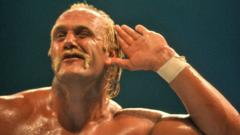As Elon Musk steps down from the Department of Government Efficiency (Doge), President Trump assures reporters that Musk will maintain a presence in the White House to continue reform efforts, even amid controversies and critiques of Doge's effectiveness.
Musk's Departure from Doge Sparks Controversy and Future Implications

Musk's Departure from Doge Sparks Controversy and Future Implications
In a farewell press conference, President Trump emphasized that Elon Musk's influence will remain within the White House, despite his exit from the cost-cutting initiative.
In a highly publicized farewell event in the Oval Office, President Trump announced that Elon Musk's tenure at the Department of Government Efficiency (Doge) is concluding, yet he will not be fully absent from the administration. “He's not really leaving,” Trump claimed, suggesting Musk would frequently return to assist in ongoing initiatives aimed at cutting government expenditures.
Musk's departure comes 130 days after Trump assumed office, the maximum time allowed for a "special government employee." Doge, an advisory body created to streamline government operations, aims to reduce the national debt, estimated at $36 trillion. Despite its goals, Musk’s work at Doge has not been without its controversies, highlighted by significant layoffs in federal agencies and the slashing of several USAID programs, which has drawn protests and calls for boycotts against his companies, particularly Tesla.
During the press conference, Trump again lauded Musk's contributions to the administration, attributing him with spearheading crucial reforms. He reflected on Doge's efforts, claiming it has saved the government $175 billion, although a BBC analysis raised questions regarding the transparence of these figures, finding only $61.5 billion was properly itemized.
Furthermore, Musk stated that Doge would persist in its mission to achieve $1 trillion in spending reductions. This meeting followed Musk’s recent expressions of disappointment regarding Trump’s ambitious tax break plan, which he believes might conflict with Doge's objectives.
The discussion also veered into personal territory when Musk addressed rumors and critiques surrounding his lifestyle and health. When questioned about reports of drug use during the campaign, Musk deflected attention by referencing ongoing defamation litigation involving the New York Times and Washington Post, questioning their reliability.
The press conference concluded on a more humorous note as Musk humorously explained an injury to his eye by sharing an anecdote about his son, X Æ A-12, reinforcing the unpredictable nature of his time in office. Despite Musk's exit, it seems likely that his influence within the White House—and particularly in relation to Doge—will continue to shape discussions around government efficiency and spending in the months to come.




















